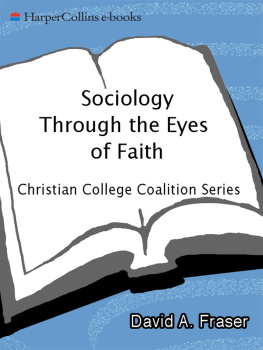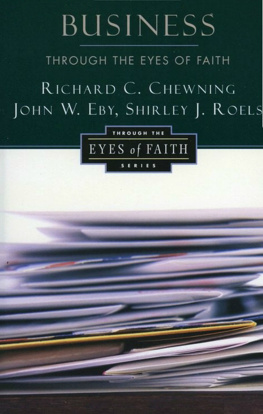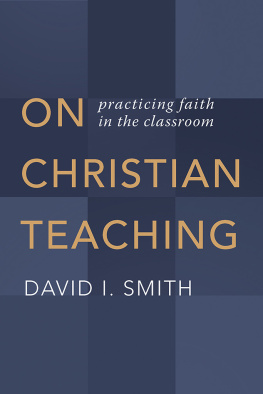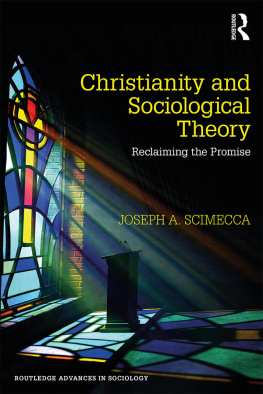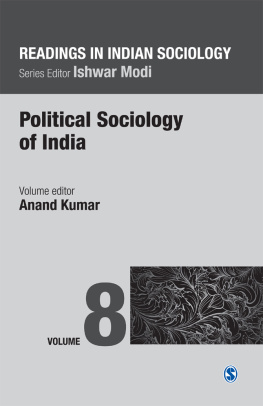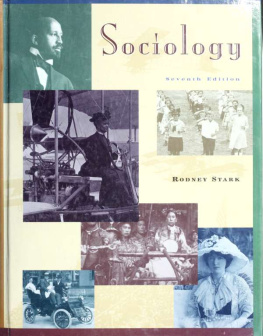David A. Fraser - Sociology Through the Eyes of Faith
Here you can read online David A. Fraser - Sociology Through the Eyes of Faith full text of the book (entire story) in english for free. Download pdf and epub, get meaning, cover and reviews about this ebook. year: 2013, publisher: HarperCollins, genre: Religion. Description of the work, (preface) as well as reviews are available. Best literature library LitArk.com created for fans of good reading and offers a wide selection of genres:
Romance novel
Science fiction
Adventure
Detective
Science
History
Home and family
Prose
Art
Politics
Computer
Non-fiction
Religion
Business
Children
Humor
Choose a favorite category and find really read worthwhile books. Enjoy immersion in the world of imagination, feel the emotions of the characters or learn something new for yourself, make an fascinating discovery.
- Book:Sociology Through the Eyes of Faith
- Author:
- Publisher:HarperCollins
- Genre:
- Year:2013
- Rating:5 / 5
- Favourites:Add to favourites
- Your mark:
- 100
- 1
- 2
- 3
- 4
- 5
Sociology Through the Eyes of Faith: summary, description and annotation
We offer to read an annotation, description, summary or preface (depends on what the author of the book "Sociology Through the Eyes of Faith" wrote himself). If you haven't found the necessary information about the book — write in the comments, we will try to find it.
Colorfully written by two popular and respected sociologists, this volume shows how sociology has evolved, how it became divided from Christian faith, and how Christian sociologists can make sense of this branch of social science.
Sociology Through the Eyes of Faith — read online for free the complete book (whole text) full work
Below is the text of the book, divided by pages. System saving the place of the last page read, allows you to conveniently read the book "Sociology Through the Eyes of Faith" online for free, without having to search again every time where you left off. Put a bookmark, and you can go to the page where you finished reading at any time.
Font size:
Interval:
Bookmark:

The Beast in the Courtyard
The Confrontation Between Christian Faith and Sociology
To See Is Not to See
Putting Religion in Its Place
Putting Sociology in Its Place
Hallucinations of Direct Encounters
Guerrilla Warfare at the Boundaries
The Varieties of Sociological Experience
Sociological Paradigms
A Case Study in Socialization
The Rise of the Modern World
The Perennial Quests of Social Insight
Faith Seeking Social Understanding
Learning to Speak with a Biblical Accent
God and Culture
Theological Paradigms
The Elementary Forms of Thinking Christianly About Society
What Christians Want in Society
The Kingdoms of This World and the Kingdom of God
Blending Sociology and Faith
Biology Through the Eyes of Faith
Business Through the Eyes of Faith
History Through the Eyes of Faith
Literature Through the Eyes of Faith
Psychology Through the Eyes of Faith

The Christian College Coalition is an association of Christian liberal arts colleges and universities across North America. More than thirty Christian denominations, committed to a variety of theological traditions and perspectives, are represented by our member colleges. The views expressed in this volume are primarily those of the authors and are not intended to serve as a position statement of the Coalition membership. For more information about the Christian College Coalition write to Christian College Coalition, 329 Eighth Street, NE. Washington, DC 20002.
SOCIOLOGY THROUGH THE EYES OF FAITH . Copyright 1992 by Christian College Coalition. All rights reserved under International and Pan-American Copyright Conventions. By payment of the required fees, you have been granted the non-exclusive, non-transferable right to access and read the text of this ebook on-screen. No part of this text may be reproduced, transmitted, down-loaded, decompiled, reverse engineered, or stored in or introduced into any information storage and retrieval system, in any form or by any means, whether electronic or mechanical, now known or hereinafter invented, without the express written permission of HarperCollins ebooks.
Library of Congress Cataloging-in-Publication Data
Fraser, David Allen
Sociology through the eyes of faith / David A. Fraser and Tony Campolo.
p. cm.
Christian College Coalition.
Includes bibliographical references.
ISBN 978-0-06-061315-0
1. Sociology, Christian. I. Campolo, Anthony. II. Christian College Coalition (U.S.). III. Title.
BT738.F657 1992
261.5dc20
9155337
08 09 10 11 12 RRD(H) 10 9 8 7 6 5 4 3 2 1
EPub Edition MAY 2013 ISBN: 9780062292148
SOCIOLOGY TASK FORCE MEMBERS
Scan D. Gaede
Gordon College
Russ Heddlendorf
Covenant College
David O. Moberg
Marquette University
Richard Perkins
Houghton College
Margaret M. Poloma
University of Akron
SERIES ADVISORY BOARD MEMBERS
Nicholas Wolterstorff
Yale University
David Benner
Redeemer College
Richard Bube
Stanford University
David Allen Hubbard
Fuller Theological Seminary
Karen Longman
Christian College Coalition
Ann Paton
Geneva College
Timothy Smith
Johns Hopkins University
Richard T. Wright
Gordon College
This book is dedicated to:
James M. Buck Hatch ,
exemplary teacher and integrator
of faith and learning
S ociology, as this book argues, is modernity struggling to come to self-understanding. Beyond a doubt our modern social world is profoundly different from any other. What accounts for its emergence? What are its most fundamental traits? What sustains it in existence? What are the characteristic sorrows of those who live in this world; what, their characteristic joys? Is there any way to diminish the sorrows without eliminating the joys? These are sociologys questions. And as the authors remark, Sociology both cries with those who lament the loss of the old and rejoices with those who celibrate the new. It is an ambivalent discipline which, given the paradoxes of modernity, has every right both to rejoice and to weep.
Whereas sociology is thus a perspective on modernity, this book is in turn a perspective on sociology. When one looks at sociology through the eyes of faith, what does one see? What is the aim of the sociologist? Is that aim important? What are the characteristic assumptions of sociologists? Are those assumptions correct? What are the achievements? What, the failures?
To fully describe the genius of this book we must use a second metaphor as well. Not only do the authors look at sociology through the eyes of faith and tell us what they have seen. They also listen to sociology with the ears of faithlisten to what sociology has to say to and about Christianityand tell us what they have heard.
The book is thus more a conversation than a perspective. Two authors, both deeply embedded in the Christian faith, richly acquainted with its theological history, both skilled professional sociologists, obviously in love with their field, bring these two sides of themselves into a fascinating and illuminating conversation with each other. Questions that we had already been asking get discussed; most if not all Christians have questions about sociology and most if not all sociologists have questions about Christianity. But from the authors deft use of examples new and probing questions emerge that most of us had never thought of. They dont all get answered; but the asking itself is illuminating.
Nicholas Wolterstorff
Yale University
T here is only one truth. It belongs exclusively neither to science nor to Christian faith. Nor do humans have a neat map with science in one corner of their intellectual world and religious faith at a different zip code. For better or worse, faith and science intertwine in actual practice.
As the authors of this book, we are writing from within a Christian worldview. Our conviction is that the relations between faith and sociology can be quite positive. We believe the Christian worldview provides motivations and resources that lead to energetic and careful work in sociological arenas.
The early history of sociology contains many surprises for those who think that sociologys roots are purely secular. Several of the earliest founders of empirical and theoretical sociological work were people motivated by their Christian faith. For the most part, their stories have not been told by later secular sociologists. There are many reasons for this. We will examine a few of them in this book. There is, however, widespread agreement that the Christian tradition was the soil from which modern Western science sprang and flourished.
Many early scientists, particularly those who studied the physical world, were Christians. They studied the universe as Gods rational and contingent creation, seeking in its mysteries parables of the wisdom and power of God. They believed that their studies would unravel truths about God and the creation. They felt that what they learned would help make a better world, more in line with what God wanted. Many contemporary scientists continue to practice science as an expression of their Christian faith.
Modern sociology emerged with the modern industrial world in Western Europe and North America. Part of its originating impulse came from Christians who wished to understand the social world. These early thinkers felt that the systematic study of society could help create a better world for people. They wanted society to conform to the norms of the Kingdom of God. They sought knowledge that would help humans achieve higher levels of justice and righteousness in society. Around them the old social world was melting down in the fiery heat of modernity. It needed rebuilding. They hoped for a better society, not just a society with better machines.
Font size:
Interval:
Bookmark:
Similar books «Sociology Through the Eyes of Faith»
Look at similar books to Sociology Through the Eyes of Faith. We have selected literature similar in name and meaning in the hope of providing readers with more options to find new, interesting, not yet read works.
Discussion, reviews of the book Sociology Through the Eyes of Faith and just readers' own opinions. Leave your comments, write what you think about the work, its meaning or the main characters. Specify what exactly you liked and what you didn't like, and why you think so.

